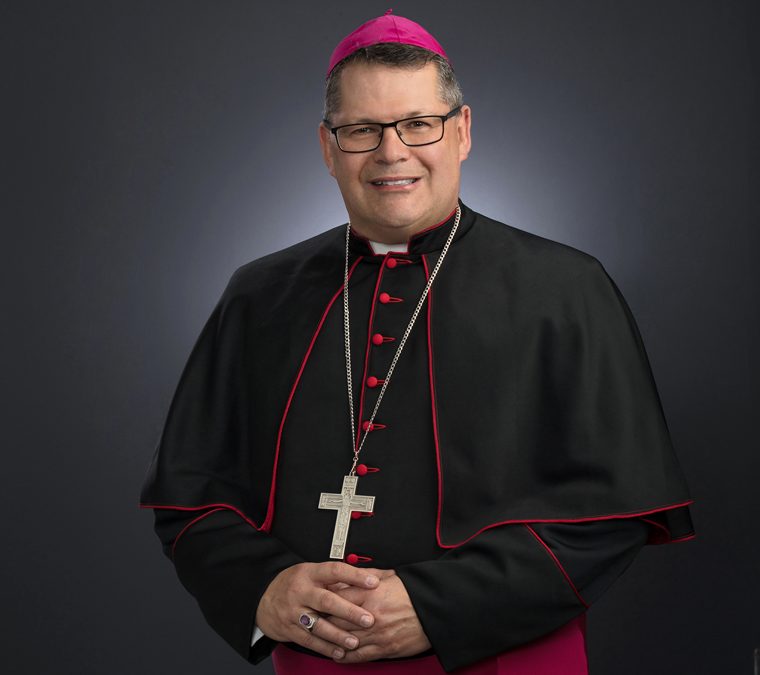The month of January has a variety of observances that are important to our local Church in Syracuse — the birthday of Dr. Martin Luther King, Jr.; the Week of Prayer for Christian Unity from January 18 to 25; the Day of Prayer and Penance for the Legal Protection of Unborn Children on January 22; the Memorial of St. Marianne Cope on January 23; and, this year, a new celebration on the Third Sunday of Ordinary Time on January 26: Sunday of the Word of God. If I had to connect all of them using a common thread, I would pose the questions I asked in the Cathedral this past weekend as I preached at the Sunday Masses: “If you and I recognize Jesus in our lives, can our lives really remain the same? How serious are we when we pray the words, ‘Here I am, Lord, I come to do your will?’”
In introducing our newest January celebration in the Apostolic Letter “Aperuit Illius” (“He Opened Their Minds”), Pope Francis wrote:
With this Letter, I wish to respond to the many requests I have received from the people of God that the entire Church celebrate, in unity of purpose, a Sunday of the Word of God. It is now common for the Christian community to set aside moments to reflect on the great importance of the word of God for everyday living. The various local Churches have undertaken a wealth of initiatives to make the sacred Scripture more accessible to believers, to increase their gratitude for so great a gift, and to help them to strive daily to embody and bear witness to its teachings.
The Second Vatican Council gave great impulse to the rediscovery of the word of God, thanks to its Dogmatic Constitution Dei Verbum, a document that deserves to be read and appropriated ever anew…. To advance this teaching, Pope Benedict XVI convoked an Assembly of the Synod of Bishops in 2008 on “The Word of God in the Life and Mission of the Church,” and then issued the Apostolic Exhortation Verbum Domini, whose teaching remains fundamental for our communities…. It is fitting, then that the life of our people be constantly marked by this decisive relationship with the living word that the Lord never tires of speaking to his Bride, that she may grow in love and faithful witness (2).
Consequently, I hereby declare that the Third Sunday in Ordinary Time is to be devoted to the celebration, study and dissemination of the word of God. This Sunday of the Word of God will thus be a fitting part of that time of the year when we are encouraged to strengthen our bonds with the Jewish people and to pray for Christian unity. This is more than a temporal coincidence: the celebration of the Sunday of the Word of God has ecumenical value, since the Scriptures point out, for those who listen, the path to authentic and firm unity.
The various communities will find their own ways to mark this Sunday with a certain solemnity. It is important, however, that in the Eucharistic celebration the sacred text be enthroned, in order to focus the attention of the assembly on the normative value of God’s word (3).
For me, that image of enthroning God’s Word not only in our churches, but even more importantly in our hearts, is at the very core of what it means to be a Christian. A central tenet of the Christian faith is that, “The Word became flesh and made his dwelling among us” (Jn 1:14). That is why throughout the entire Second Vatican Council each day the Word of God was enthroned in the midst of the Council participants. And yet, I return again to the question of the day: How is the Word of God to be found dwelling in us?
This leads me to the Week of Prayer for Christian Unity that we are in the midst of and its theme of, “They showed us unusual kindness” (Acts 28:2). Again, let me share with you a little background to this year’s theme to show how it brings the Word of God alive for us today, from the annual brochure jointly prepared and published by the Pontifical Council for Christian Unity and the Commission on Faith and Order of the World Council of Churches:
The materials for the 2020 Week of Prayer for Christian Unity have been prepared by the Christian churches in Malta and Gozo (Christians Together in Malta). On February 10, many Christians in Malta celebrate the Feast of the Shipwreck of St. Paul, marking and giving thanks for the arrival of Christian faith on these islands. The reading from the Acts of the Apostles used for the feast is the text chosen for this year’s Week of Prayer.
The story begins with Paul being taken to Rome as a prisoner (Acts 27:1). Paul is in chains, but even in what turns out to be a perilous journey, the mission of God continues through him.
This narrative is a classic drama of humanity confronted by the terrifying power of the elements. The passengers on the boat are at the mercy of the forces of the seas beneath them and the powerful tempest that rages about them. These forces take them into unknown territory, where they are lost and without hope.
The 276 people on board the ship are divided into distinct groups. The centurion and his soldiers have power and authority but are dependent on the skill and experience of the sailors. Although all are afraid and vulnerable, the prisoners in chains are the most vulnerable of all. Their lives are expendable; they are at risk of summary execution (27:42). As the story unfolds, under pressure and in fear for their lives, we see distrust and suspicion widening the divisions between the different groups.
Remarkably, however, Paul stands out as a center of peace in the turmoil. He knows that his life is not governed by forces indifferent to his fate, but rather is held in the hands of the God to whom he belongs and whom he worships (see 27:23). Because of this faith, he is confident that he will stand before the emperor in Rome, and in the strength of this faith he can stand before his fellow travellers and give thanks to God. All are encouraged. Following Paul’s example, they share bread together, united in a new hope and trusting in his words.
Today many people are facing the same terrors on the same seas. The very same places named in the reading (27:1, 28:1) also feature in the stories of modern-day migrants. In other parts of the world, many others are making equally dangerous journeys by land and sea to escape natural disasters, warfare and poverty. Their lives, too, are at the mercy of immense and coldly indifferent forces — not only natural, but political, economic and human. This human indifference takes various forms: the indifference of those who sell places on unseaworthy vessels to desperate people; the indifference of the decision not to send out rescue boats; and the indifference of turning migrant ships away. This names only a few instances. As Christians together facing these crises of migration this story challenges us: do we collude with the cold forces of indifference, or do we show “unusual kindness” and become witnesses of God’s loving providence to all people?
Hospitality is a much needed virtue in our search for Christian unity. It is a practice that calls us to a greater generosity to those in need. The people who showed unusual kindness to Paul and his companions did not yet know Christ, and yet it is through their unusual kindness that a divided people were drawn closer together. Our own Christian unity will be discovered not only through showing hospitality to one another, important though this is, but also through loving encounters with those who do not share our language, culture or faith.
The above reflection helps you and I to see the direction the Word of God can give to our daily lives. It is a compass for us on the path of life and all that gets tossed at us. I invite all members of the Church of Syracuse to have the Word of God as part of our daily prayer. Enthrone it in your homes by having the Bible or a New Testament in a place where it can be read by you and by other family members. There are wonderful Scripture aides, such as The Word Among Us, The Living Word, or even the footnotes in our Bibles that can help us reflect on how God’s Word can become flesh in you and me. Particularly important are parents reading to their children Bible stories from a young age so that it can become part of the constitution of their lives.
Let me leave you with a prayer for our week ahead:
God, your word is a light to our steps
and without you we are lost and disorientated.
Enlighten us so that, through your word, we may walk your path.
May our churches crave your guiding, consoling and transforming presence.
Give us the honesty we need to recognize
when we make it difficult for others to see your light,
and the grace we need to share your light with others.
We ask this in the name of your Son,
who calls us, his followers, to be light to the world. Amen.






